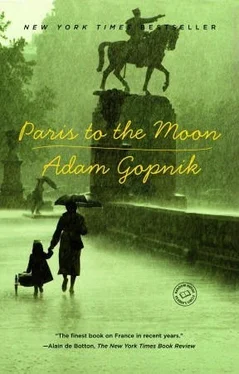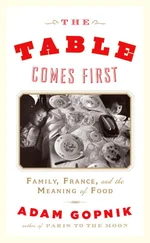The French believe that all errors are distant, someone else’s fault. Americans believe that there is no distance, no difference, and therefore that there are no errors, that any troubles are simple misunderstandings, consequent on your not yet having spoken English loudly enough.
It is, still, amazing to see how vast a screen the differences of language can be—not an opaque but a kind of translucent one. You sort of see through it, but not quite. There is a book to be written, for instance, on small errors in subtitles. In the Fred Astaire musical Royal Wedding, for instance, the English girl he falls for, played by Sarah Churchill (daughter of Sir Winston), is engaged to an American, whom we never see but who’s called Hal—like Falstaff’s prince, like a good high Englishman. That English H , though, was completely inaudible to the French translator who did the subtitles, and so throughout the film the absent lover is referred to in the subtitles as Al—Al like a stagehand, Al like my grandfather. If you have the habit of print addiction, so that you are listening and reading at the same time, this guy Al keeps forcing his way into the movie. “But what shall I say to Hal—that I have never loved him?” Patricia says to Fred. Down below it says, “ Et Al—qu’est-ce que je vais lui dire?”
My other favorite subtitle was in some contemporary comedy that we went to see—we see about a movie every six months, where once I saw three a day—in which there was a reference to American talk shows. “And what do you want me to do: go on Oprah, Geraldo, or Sally Jessy?” the character asked. The translator did fine with Oprah and Geraldo but could make nothing of the last, so Sally with her glasses became a non—non sequitur question. “ Oprah, Geraldo—et sale est Jesse?” the subtitle read—Oprah, Geraldo—and Jesse is dirty?” This network of distant errors obviously occludes itself in front of us all the time, every day, and mostly we don’t know it.
There are at least three moments a month when you are ready to leap across a counter or a front seat to strangle someone: the woman at France Telecom who won’t give you the fax ribbons that are there on the counter in front of her because she can’t find them on the computer inventory; the chair restorer who looks at your beautiful Thonet rocker and then announces, sniffily, that it isn’t worth his time; the woman who sells you a poster and then announces that she has no idea where you might go to frame it; the bus driver who won’t let an exhausted pregnant woman off the front door of the bus (you’re supposed to exit from the rear) from sheer bloody-mindedness. It affects Martha much less than me, leading me to suspect that it is essentially a masculine problem. My trouble is that I think like a Frenchman: I transform every encounter into a competition in status and get enraged when I lose it. As Cioran said, it’s hard for me to live in a country where everyone is as irascible as I am.
At the same time, I find myself often reduced to an immigrant helplessness. We went to BHV, for instance, earlier this year to frame our Paris to the Moon engraving. I have had it up in my study, an icon to write under. There’s a nice do-it-yourself framing shop up there, and lacking a framer to go to, we thought we just ought to, well, do it ourselves. Back in New York we knew a framer who did our frames, and I prided myself, within limits, on having learned a thing or two about what made the right edge for the right picture. We began to sort around with simple white mats and black wooden frames. As we were doing it, a lady came up to us: a Frenchwoman in her seventies, with pearls and a strong jaw and silver hair. She had a couple of handsome flower prints that she was framing for herself. “No, no, children,” she said. “You are doing that quite incorrectly. This, you see,” she said, “is a nineteenth-century print. It needs a nineteenth-century mat, a nineteenth-century frame.” She took the white-and-black frame away from us—put them right back—and chose a cream mat and a fake, “antiqued” gold frame. “There,” she said. “ That is the French nineteenth century,” she said, and took the frame and the print and the mat all up to the counter for us. We looked at each other sheepishly and went ahead and bought them. I used to know something about art, or thought I did, I muttered to myself, all the way home. The print actually looks pretty nice in its gold frame. When I remember the moment now, I remember my utter helplessness and how she smelled of a wonderful tea-rose perfume.
The other side of French official arrogance is French improvised and elaborate courtesy. The men from the department store Bon Marche, the deliverymen, called last night, to deliver the wicker kitchen organizer. “We have to be there early, because it’s a small street. Six-thirty.”
“It’s a little too early for us,” I said. “Let’s make it later.” “Ah, no. Its impossible. Six-thirty or nothing.” “All right,” and I hung up the phone, silently cursing French arrogance and the lack of any kind of service ethic.
Then, the next morning, at six forty-six, I was just awakened by the sound of the gentlest possible knocking on the front door—so butterfly quiet that at first I imagined that it must have been Luke Auden stirring in bed. But then there it was again, quiet but insistent. I got up, put on my robe, got to the front door, and stared out the spyglass. There were two workmen in the hallway, leaning over gently, knocking with their knuckles, as lightly as ghosts. I slipped the door open and got not a smile, but a look of acknowledgment, and they brought the kitchen organizer in with balletlike light-footedness. Thank you,” I said, “the baby is sleeping.” They nodded. We know. I signed the invoice, and they were gone, and I went back to sleep.
And then there is the chair. It started by accident one rainy Monday, after we had been to the Musee d’Orsay, and I had failed to get Luke much interested in my old favorites, Monets and Manets. I still find going to the Musee d’Orsay an infuriating, maddening experience. (Apparently, despite my superficial essays at amused blandness, I realize, reading this, that I’m a real pepperpot, a hothead. Billy Martin in France.) That vast, handsome railroad station so horribly done over in Wiener Werkstatte fashion by Gae Aulenti; the stupid, unquestioned dominance of the worst pompier art of the nineteenth century in the main hall as though saying, here are our real treasures. And the greater pain that only the pompier official art could look any good in such a vast and frigid space. I no longer find the taste for nineteenth-century French academic art, which can be amusing if seen small on a slide screen, the least bit likable. It is horrible, depressing beyond words, the revenge of official culture on life and youth, on reality itself. I swear to God I would take a razor to The Romans of the Decadence without a moment’s hesitation.
And then having to take the escalator up all the way to the far upper floors—a garret, in museum terms, in order to see the great pictures, every one of which looked incomparably better in the old Jeu de Paume. It is a calculated, venom-filled insult on the part of French official culture against French civilization, revenge on the part of the academy and administration against everyone who escaped them. French official culture, having the upper hand, simply banishes French civilization to the garret, sends it to its room. What one feels, in that awful place, is violent indignation—and then an ever-increased sense of wonder that Manet and Degas and Monet, faced with the same stupidities of those same academic provocations in their own lifetimes, responded not with rage but with precision and grace and contemplative exactitude.
Читать дальше












